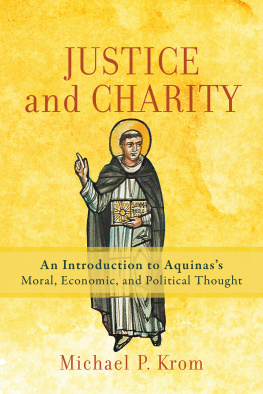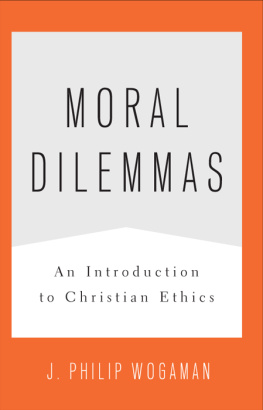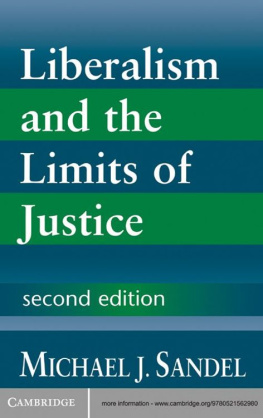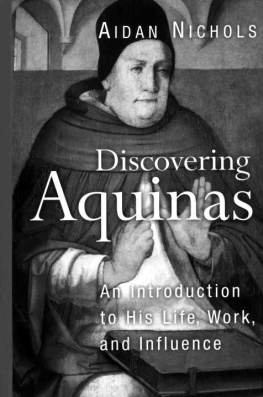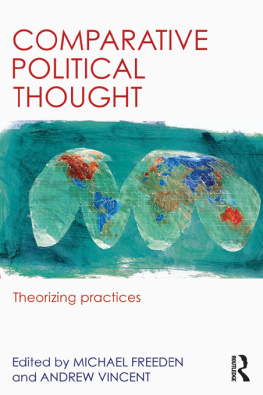Michael P. Krom - Justice and Charity: An Introduction to Aquinass Moral, Economic, and Political Thought
Here you can read online Michael P. Krom - Justice and Charity: An Introduction to Aquinass Moral, Economic, and Political Thought full text of the book (entire story) in english for free. Download pdf and epub, get meaning, cover and reviews about this ebook. year: 2020, publisher: Baker Publishing Group, genre: Romance novel. Description of the work, (preface) as well as reviews are available. Best literature library LitArk.com created for fans of good reading and offers a wide selection of genres:
Romance novel
Science fiction
Adventure
Detective
Science
History
Home and family
Prose
Art
Politics
Computer
Non-fiction
Religion
Business
Children
Humor
Choose a favorite category and find really read worthwhile books. Enjoy immersion in the world of imagination, feel the emotions of the characters or learn something new for yourself, make an fascinating discovery.
- Book:Justice and Charity: An Introduction to Aquinass Moral, Economic, and Political Thought
- Author:
- Publisher:Baker Publishing Group
- Genre:
- Year:2020
- Rating:4 / 5
- Favourites:Add to favourites
- Your mark:
- 80
- 1
- 2
- 3
- 4
- 5
Justice and Charity: An Introduction to Aquinass Moral, Economic, and Political Thought: summary, description and annotation
We offer to read an annotation, description, summary or preface (depends on what the author of the book "Justice and Charity: An Introduction to Aquinass Moral, Economic, and Political Thought" wrote himself). If you haven't found the necessary information about the book — write in the comments, we will try to find it.
Michael P. Krom: author's other books
Who wrote Justice and Charity: An Introduction to Aquinass Moral, Economic, and Political Thought? Find out the surname, the name of the author of the book and a list of all author's works by series.
Justice and Charity: An Introduction to Aquinass Moral, Economic, and Political Thought — read online for free the complete book (whole text) full work
Below is the text of the book, divided by pages. System saving the place of the last page read, allows you to conveniently read the book "Justice and Charity: An Introduction to Aquinass Moral, Economic, and Political Thought" online for free, without having to search again every time where you left off. Put a bookmark, and you can go to the page where you finished reading at any time.
Font size:
Interval:
Bookmark:
2020 by Michael P. Krom
Published by Baker Academic
a division of Baker Publishing Group
PO Box 6287, Grand Rapids, MI 49516-6287
www.bakeracademic.com
Ebook edition created 2020
All rights reserved. No part of this publication may be reproduced, stored in a retrieval system, or transmitted in any form or by any meansfor example, electronic, photocopy, recordingwithout the prior written permission of the publisher. The only exception is brief quotations in printed reviews.
Library of Congress Cataloging-in-Publication Control Number: 2019048613
ISBN 978-1-4934-2436-8
Scripture quotations are from The Catholic Edition of the Revised Standard Version of the Bible, copyright 1965, 1966 National Council of the Churches of Christ in the United States of America. Used by permission. All rights reserved worldwide.
To my students
Cover
Half Title Page
Title Page
Copyright Page
Dedication
Acknowledgments
Abbreviations
Chapter Guide
Introduction
Part 1: Moral Theory
1. The Natural Desire for Happiness (Moral Philosophy)
2. Grace and Perfect Happiness (Moral Theology)
Part 2: Economic Theory
3. The Goods of the Earth and the Good Life (Economic Philosophy)
4. The Goods of the Earth and Perfect Happiness (Economic Theology)
Part 3: Political Theory
5. The Common Good in the Earthly City (Political Philosophy)
6. The Twofold Citizenship of the Christian Wayfarer (Political Theology)
Part 4: The Perennial Teaching of the Angelic Doctor
7. Aquinass Moral, Economic, and Political Theory Today
Postscript
Appendix: Schema of the Virtues
Bibliography
Index
Back Cover
I have dedicated this book to my students because they both inspired this project and assisted me in its execution. Were it not for the opportunity to teach Thomistic Philosophy each fall, and for the kinds of discussions their interests generated, I would never have gone down this path. This book, then, is an attempt to charitably render a debt of gratitude, and I hope I have been successful in this. Many of them read earlier versions of this book; their critical feedback helped me to clarify my own thought as well as provide a clearer presentation to future readers. If my students are to be thanked for their assistance, it is only just that I take responsibility for any of this books shortcomings.
The monks of Saint Vincent Archabbey have provided me with the opportunity to teach the seminarians and collegians under their charge, and for this I thank them. In addition to their leadership roles in the college and the personal encouragement many of them have given me, their commitment to a life of prayer and work has been a witness and reminder to me of what academic life is all about. While I cannot thank them all, I should especially mention Archabbot Douglas Nowicki as chancellor of Saint Vincent College, Br. Norman Hipps as president, Fr. Rene Kollar as the dean who supported this project, Fr. Pat Cronauer as dean of Saint Vincent Seminary, and Fr. Andrew Campbell as my spiritual director. More importantly, the monks of Saint Vincent are to be thanked for reminding me that the purpose of writing is Ut In Omnibus Glorificetur Deus (so that in all things God may be glorified).
I am blessed to work in a collegial environment, and with this in mind I should especially acknowledge the members of the philosophy department, George Leiner, Eric Mohr, Sr. Mary Veronica Sabelli, Gene Torisky, and Margaret Watkins. Sr. Mary Veronica is to be especially thanked for our many conversations over lunch on topics ranging from Thomistic metaphysics to Italian pronunciation. In addition, I should thank those who have helped me by patiently reading parts of the manuscript or at least hearing out some of the ideas: Jerome Foss, Jason Jividen, Matthew Minerd, John Martino, Stephen Little, Kody Cooper, Adam Tate, and the blind reviewers. Further thanks go to Jonathan Sanford, Monte Brown, Chris Edelman, Daniel Kempton, Steve Cortright, Graham McAleer, and Grattan Brown for inviting me to give lectures to students at their respective colleges and universities. Finally, the editorial staff at Baker Academic has been wonderful to work with; I should especially thank Dave Nelson for his support and advice along the way, and Eric Salo as well as the rest of the editorial team for helping to make this work presentable.
In all of this, I have tried to keep in mind that my primary vocation is to my family, and I thank them for letting me slip away more often than I would have liked to see this project to completion. My wife, Jessica, loves and supports me in spite of my tendency to unleash philosophical ramblings when I should be doing more important things like helping get kids to bed or putting the groceries away. My children are fortunately too unworldly to realize that it is not normal to engage in platonic dialogues while doing yardwork or playing Frisbee, and so James, Isaac, Henry, Margaret, Malcolm, and even little Evelyn have been great partners in pursuit of Wisdom.
| CAP | Aquinas, Commentary on Aristotles Politics. Translated by Richard J. Regan. Indianapolis: Hackett, 2007. |
| Catechism or CCC | Catechism of the Catholic Church . New York: Doubleday, 1995. Available at http://www.vatican.va/archive/ccc_css/archive/catechism/ccc_toc.htm. |
| Compendium | Compendium of the Social Doctrine of the Church . Washington, DC: USCCB Publishing, 2009. Available at http://www.vatican.va/roman_curia/pontifical_ councils/justpeace/documents/rc_pc_justpeace_doc_20060526_compendio-dott-soc_en.html. |
| CST | Catholic social thought |
| DR | Aquinas, De regno . Translated by R. W. Dyson. In St. Thomas Aquinas: Political Writings . New York: Cambridge University Press, 2002. |
| SCG | Aquinas, Summa Contra Gentiles . Translated by Anton C. Pegis, FRSC. Notre Dame, IN: University of Notre Dame Press, 1991. |
| Summa or ST | Aquinas, Summa Theologiae . Translated by the Fathers of the English Dominican Province. 2nd ed. Available at http://www.newadvent.org/summa. |
References provide the relevant division within the text. For example, ST II-II.25.3ad1 refers to Summa Theologiae , Secunda secundae (second part of the second part), question 25, article 3, reply to the first objection. I have used translations that are widely available so that the nonspecialist reader can easily access them. In the case of ST , more recent translations are available, but readers would most likely be working with the online version. In places where I amend the translation for my purpose, I indicate this with a bracket and provide a note justifying the change.
St. Thomas Aquinas follows the Aristotelian tradition of dividing practical philosophy, or the philosophy of human affairs, into (1) moral philosophy, (2) economics, and (3) political philosophy. In addition, he distinguishes between the truths we can know via reason (philosophy) and those we can know via revelation (theology). After exploring Aquinass teachings, we will look at the relevance of Aquinas today in light of Catholic social thought (CST). Thus, the book is divided as follows.
Part 1: Moral Theory
Chapter 1: The Natural Desire for Happiness (Moral Philosophy)
Outline: the goal of moral philosophy is to promote a proper understanding of natural, imperfect happiness and the means to obtaining it; in particular, natural happiness requires the formation of the cardinal virtues, of which justice is the most important; the natural desire for happiness leads one to recognize the limitations of acquired virtue, thus pointing to the need for grace.
Font size:
Interval:
Bookmark:
Similar books «Justice and Charity: An Introduction to Aquinass Moral, Economic, and Political Thought»
Look at similar books to Justice and Charity: An Introduction to Aquinass Moral, Economic, and Political Thought. We have selected literature similar in name and meaning in the hope of providing readers with more options to find new, interesting, not yet read works.
Discussion, reviews of the book Justice and Charity: An Introduction to Aquinass Moral, Economic, and Political Thought and just readers' own opinions. Leave your comments, write what you think about the work, its meaning or the main characters. Specify what exactly you liked and what you didn't like, and why you think so.

